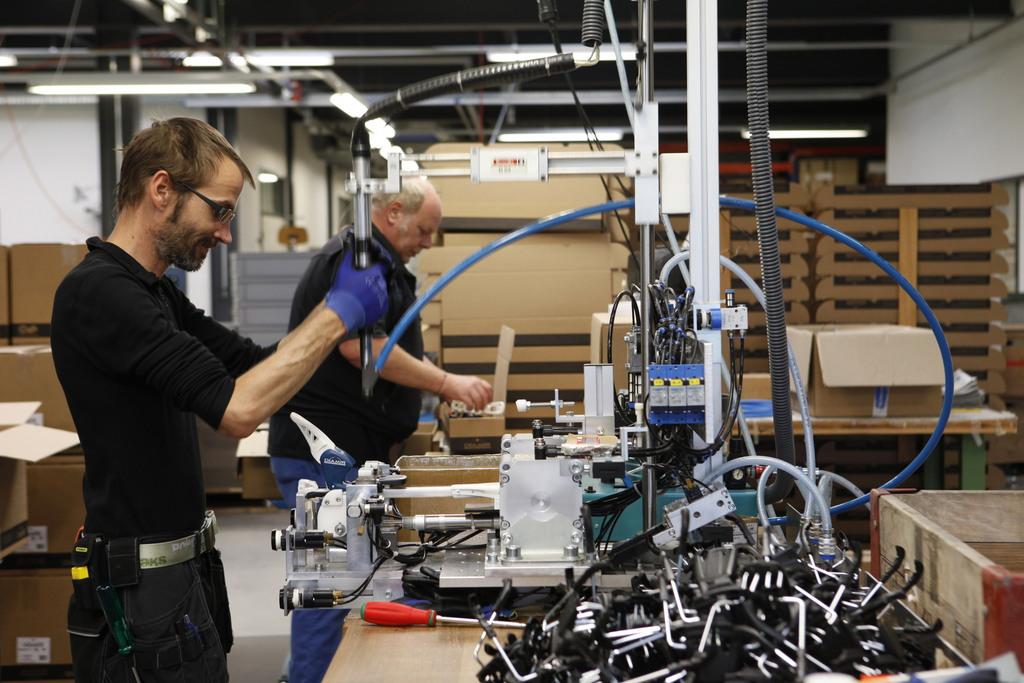Business demands smarter reform, less red tape

Beleaguered Swiss exporters have laid down the gauntlet at the government’s door. “We are tightening belts to cope with the appreciating franc. It’s about time that you did your bit by cutting the cost of regulatory red tape.”
Ever since the Swiss National Bank abandoned its franc-euro exchange rate cap last month, a range of industry bodies – from the Swiss Business Federation (economiesuisse), the Association for Small and Medium Sized Enterprises and Swissmem – have increased demands for more efficient regulation.
These groups have presented a broad palette of policy demands in three main areas: a moratorium on “business unfriendly” reforms, such as greening-up Switzerland’s energy mix or increasing shareholder rights; speeding up other reforms, particularly corporate tax and EU relations; and streamlining existing regulations to save companies time and money.
There is nothing new in Swiss business lobby groups demanding reforms to suit their members. The same calls can also be heard from counterparts in other countries.
So how does Switzerland compare in the red tape league table? Actually, quite well if international studies are anything to go by.
Switzerland gained two places this year to sit in 20th spot out of 189 countries in the World Bank’s annual Ease of Doing Business survey – a ranking that hinges on the efficiency of its regulatory environment. When it comes to paying taxes, Switzerland is the 18th most efficient country, taking firms on average 63 hours and 19 payments to meet their obligations against a global average of 264 hours and 25.9 payments.
CHF50 billion red tape bill
Such impressive conditions helped make Switzerland the world’s second most efficient economy in the IMD business school’s World Competitiveness Report last year. Report author Arturo Bris believes that improving on such a lofty status would be hard.
“There really is not much scope for Switzerland to improve its regulatory environment,” he told swissinfo.ch. Besides opening up its labour market some more (particularly to women), becoming more receptive to foreign business practices and encouraging more risk-taking by firms, there is very little tweaking to be done, he said.
“Efficient regulations are a necessary condition for economic success, but it is not the only condition,” Bris added. “A country also has to have the right business culture and tax system to drive entrepreneurship. Switzerland has this in abundance.”
But the SME Association begs to differ, having launched a campaign to drive down red tape in 2010. To kick off the lobbying strategy it commissioned KPMG to count the cost of red tape for companies in Switzerland. The report found that regulations cost Swiss companies CHF50 billion ($54 billion) a year.
The SME Association identified several areas that could shave CHF10 billion off that bill. These included simplifying VAT paperwork and harmonising import and export rules with the European Union. The Swiss economics ministry compiled its own red tape report in December 2013 that reached the same figure for potential cost savings for firms.
Economics Minister Johann Schneider-Ammann, a former business executive, appeared supportive. “There are ways to simplify and reduce costs in all areas,” he wrote in his department’s publication The Economy in February 2014. “We will dismantle unnecessary regulations and improve implementation.”
Raft of reforms
Last month, in a press conference held after the SNB abandoned its franc-euro exchange rate cap, Schneider-Ammann again identified the high cost of regulations as a barrier to business productivity. He promised to gather concrete proposals on cutting red tape in a report to be delivered in the second half of the year.
But the SME Association is unimpressed. Last month it launched a blistering attack on the government’s apparent inaction on reducing the cost of bureaucracy. While it may take until 2018 to complete all of the CHF10 billion of savings, some CHF2.2 billion could already have been achieved, the lobby group complained .
“At a political level not much has been done to resolve the problem,” the association’s directors wrote in an open letter to Schneider-Ammann on January 20. “In view of the franc’s strength, valuable preparation time has been allowed to elapse.”
With regards to other industry demands for reforms, companies might well be forced to wait even longer, or be disappointed altogether.
The path to securing Switzerland’s energy supplies for 2050 appear to be bogged down in party political differences on how to phase out nuclear power and whether to subsidise green energy sources. A March 8 referendum launched by the Liberal Greens to replace VAT with an energy tax has been condemned by business groups.
No time to waste
Reforming corporate tax laws to keep Switzerland as a land fit for foreign multinationals, but in line with EU competition rules, is very much a work in progress that will probably not be implemented until 2018. Economiesuisse is unhappy with a government proposal to help pay for the reforms with a new capital gains tax.
The EU agenda is even more complex given last year’s referendum to limit numbers of foreigner workers entering Switzerland. The vote has soured Swiss-EU relations which have virtually ground to a halt over the impasse. Finding a quick fix solution might be desirable for business, politicians and the public alike, but appears a pipe dream at the moment.
Likewise, Swissmem’s call to find a solution for the pension system, currently under strain from an ageing population, has proved politically problematic.
Nevertheless, in light of the SNB’s decision to let the franc appreciate and the European Central bank’s promise to flood the markets with more than €1 trillion, efforts must be redoubled to find answers, according to Swissmem, the umbrella group for the electrical engineering, machine building and metals industry.
“It is high time to tackle these issues quickly,” it stated late last month.
The State Secretariat for Economic Affairs (SECO) regularly asks companies about the burden of regulations in its Bureaucracy Monitor. In January, some 54.2% of the 1,809 companies surveyed said that the red tape burden was “high” or “very high”. The rest thought that bureaucracy was “manageable” or “light”.
Red tape was particularly burdensome in the areas of food hygiene, construction, vocational training, auditing and VAT, the survey found. Companies called for more efficient online tools to complete paperwork and unifying of different types of similar regulations into one set of paperwork.
The same survey conducted in 2012 showed that 50.5% of companies found the red tape burden to be high or very high. Even in 2012, most firms felt that the administrative burden had increased over the previous three years.

In compliance with the JTI standards
More: SWI swissinfo.ch certified by the Journalism Trust Initiative



You can find an overview of ongoing debates with our journalists here. Please join us!
If you want to start a conversation about a topic raised in this article or want to report factual errors, email us at english@swissinfo.ch.